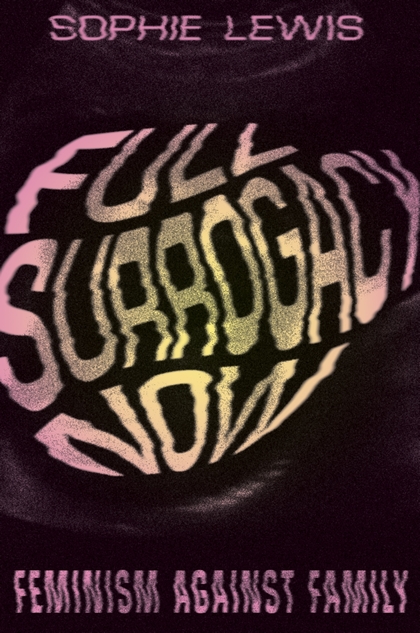(THIS ARTICLE IS MACHINE TRANSLATED by Google from Norwegian)
Feminist and geographer Sophie Lewis challenges in Full Surrogacy Now the traditional conceptions of pregnancy and the family. The book is an important contribution in the liberating policy on gender equality and equal rights over one's own body.
Surrogacy is illegal in most European countries, including Norway. Albania and Cyprus have no laws on this, while Ireland, the Netherlands, Belgium and the Czech Republic lack laws recognizing surrogacy. Surrogacy, on the other hand, is legal in the United Kingdom, in Portugal for heterosexual couples with medical needs; in Greece for heterosexual couples and single women, including foreigners; in Russia for Russians and foreigners, in Ukraine for heterosexual married couples, including foreigners, in Georgia for heterosexual couples, including foreigners.
In Norway, surrogacy is illegal because the Children's Act (Chapter 2, section 2) states: "An agreement to give birth to another child is not binding." not inserted into the uterus of a woman other than the woman the egg cell originated from. "
For Norwegian health professionals, it is forbidden to perform gestational surrogacy, where the surrogate is genetically unrelated to the child. Traditional surrogacy, where the surrogate is the child's genetic mother, can be exercised within the limits of Norwegian law, and then the parties themselves are responsible for conception.
Fodder machines
The most controversial part of The Communist Manifesto (1848) by Karl Marx and Friedrich Engels is about abolishing the family. The family, according to Marx and Engels, is where patriarchy and capitalism work together and women are birth machines. IN Full Surrogacy Now: Feminism Against Family Lewis builds on the author's ideas about abolishing the family while reconstructing the pregnancy itself. She insists that bringing a child to term, giving birth and being a mother is a job.
Prohibition of self-determined surrogacy acts
about controlling the woman's body.
Lewis wants a world where both commercial and altruistic surrogacy is legal and incorporated into the health and social system so that the surrogate and clients can safely and safely deliver the desired child. As the law is now, surrogacy is done in a safe way that is not the best for the child.
Being a surrogate is one of the oldest professions in the world, and although it is currently banned in Norway and many other countries, it is still going on. A recent study by the NGO Families Through Surrogacy showed that Norwegians are the largest user group of surrogacy in Europe.
Many women will not be able to conceive for health reasons. Others do not want to go through a pregnancy, but want to have children. Gay couples can't get pregnant. Therefore, surrogacy is a good alternative.
Self-determined surrogacy
Despite the opportunities that surrogacy opens up for, the European Parliament and The Hague in 2015 and 2016 believed that surrogacy should be prohibited without exception because it "violates women's dignity and human rights and makes their bodies a commodity."

Today's transnational commercial surrogacy is characterized as "dehumanizing", "uterine trafficking" and "pimping". World ecologist Daniela Danna says that surrogates are victims of "false consciousness" and have "made themselves a slave" by creating a child to be separated from his "mother." Lewis, on the other hand, writes that a study in the period 2007 to 2014 concluded that surrogates do not view themselves as victims or as people who are abused.
Furthermore, Lewis paid tribute to the bodily generosity of surrogates and believes that the world should introduce full surrogacy now. Not all women are lucky enough to have a girlfriend or family member who can be a surrogate mother when they want a child themselves, but can't bear it. Therefore, the option of commercial surrogacy should also be present.
The book is an important contribution in liberating politics
about gender equality and equal rights over one's own
body.
The name of the genetic parents, not those of the surrogate, will be on the birth certificate of the child. The surrogate has no rights or obligations to the child, adoption is not nøand the surrogate cannot keep the child either. Lewis believes that a "smart" surrogate should be emotionally prepared for the permanent separation from the child she has brought forth.
Campaigns such as Stop Surrogacy Now believe that "uterine loans" are not in the best interests of the child, as it separates the child from the "mother" and thus destroys the bond between mother and child. According to Lewis, this is a question of definition: Who is the "mother" of the child? The surrogate who has carried it, the woman / man who has the child's genes, or the woman / man who has the daily care of the child?
The child does not need to grow in the biological mother's womb to be hers; it has nothing to say to the mother-child bond. What about women who carry their baby forward but who feel disgust when the baby is born? What about depression before and / or after birth? Who says surrogacy is more risky than other professions?
Lewis writes: "Sometimes people can't become mothers; sometimes mothers did; sometimes they don't love their babies; sometimes they abort them, abuse them, abandon them, divorce their co-parent, or even kill them. ”
Prohibition of self-determined surrogacy is about controlling the woman's body.






